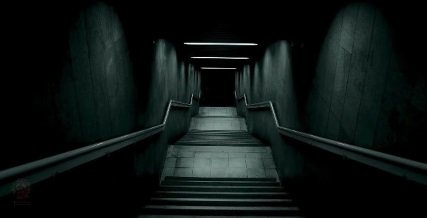In the quiet stillness of a foggy night, a lone bus stop stood illuminated under the dim glow of a streetlamp, its red roof a beacon in the mist. The surrounding parking lot was empty, save for a solitary traffic cone, casting long shadows on the pavement.
Inside the booth, a forgotten scooter leaned against the glass, hinting at a hurried departure. The air was thick with mystery, as if the booth held secrets whispered through the receiver, waiting for the next passerby that will never come, to uncover its tales.
In a forgotten corner of a once-bustling city, there stood a lonely bus stop booth, an antiquated relic of days long past. Enclosed within stained glass panels, its muted hues told tales of vibrant stories—a tapestry woven with the voices of countless souls who had once sought solace in its cramped confines. Now, it stood abandoned, enveloped in a palpable emptiness that echoed throughout the fog-laden streets.
The booth resided at what was once a favored bus stop, where laughter and chatter filled the air. But time has a way of erasing memories, and what was once a hub of human connection had succumbed to the weight of sorrow. Those who hurried by now cast sidelong glances, their gaze skimming over its darkened depth as if frayed threads of nostalgia tugged at their hearts.
But they never dared to step closer. There was an unnerving quality about that booth, an air of desolation that loomed heavy, infusing the very atmosphere with somber shades of dread.
It all began when the city fell victim to its own aspirations—the relentless march of modernization swept through like an insatiable beast, devouring the past in its wake. Gleaming skyscrapers rose where small shops once thrived, and busy roads choked with traffic replaced the quaint sidewalks lined with jovial faces.
As the city metamorphosed, the importance of the bus stop dwindled to obscurity, a ghost of contact in an age driven by screens and silence.
Gradually, the buses ceased their visits, having found new routes that favored faster highways and sleek terminals. The last route was canceled without fanfare, unnoticed by a community more concerned with Wi-Fi signals than the whispers carried by rustling leaves in the nearby park. Each passing day saw fewer individuals skirting its perimeter until one fateful evening, as rain fell in heavy torrents, a final beam of light flickered out.
The booth stood forlorn—silent as it soaked up the drizzles, each droplet punctuating its forsaken existence.
Despite its hollow shell, the booth bore witness to the world’s degradation: shadowy figures lingering under streetlamps, their faces contorted by worries too heavy for their thinning smiles. It heard the muffled echoes of sorrow that seeped through cracks in time—a woman grieving an estranged child, a man desperate for hope at the end of his road, lovers drifting apart under the weight of unspoken words.
They’d find refuge on a bench just steps away but never in the chilling grip of that forsaken booth.
The sadness it exuded thickened over months, years and decades—turning into despair that throbbed in the hearts of those who passed. It became an emblem of abandonment; parents warned their children not to linger near its shattered semblance of friendship because there was something unsettling about it. Forgotten calls trapped within those walls beckoned to anyone who dared approach.
A myth wrapped tightly around unseen forces claiming dominion over the booth. That spoke of people who had entered but never returned, as if they were consumed by darkness when they stepped into its gloom. And as shadows stretched long beneath a setting sun, twilight paled into a dull twilight gray—adding to the atmosphere that encased the area like a suffocating shroud.
It cried out once—a shrill echo that gained momentary traction before slipping back into obscurity. Others insisted it was a warning sign, like the dimming streetlights overhead or the rancid odors wafting from forgotten sewers. No matter how you framed it, one thing became clear: nobody would ever return.
The city shift left behind those remnants steeped in nothingness—markers of a life forsaken as memories drifted like leaves in autumn winds. The bus stop stood vigil long after all meaning faded away; its memories twisted into disturbing phantoms haunting those wandering souls lost amidst concrete jungles devoid of warmth.
Now cloaked in darkness punctuated only by flickering street lamps, it still waited—etched against a tumultuous sky, sagging under the weight of disquietude. In its stillness was sorrow; in its solitude lay desolation. It was a chamber for ghosts—a monument to memories that begged to be recalled yet clung stolidly to delusions sealed beneath layers of dust and murky shadows.
No bus would stop again at that forsaken place; instead, it would endure timelessly against the tides of change—standing solitary against unceasing progress as an eternal reminder: sometimes silence dwells louder than words ever can.









